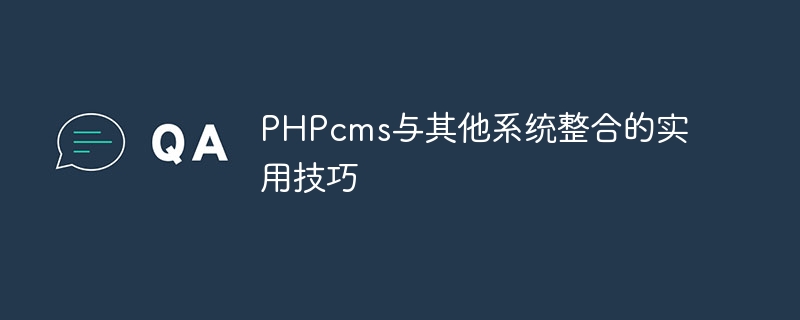Practical tips for integrating PHPcms with other systems

Practical tips for integrating PHPcms with other systems
With the continuous development of Internet technology, the field of website development has become more diverse and complex. In actual projects, we often face situations where different systems need to be integrated, which requires us to have certain skills and experience to solve these problems. This article will introduce some practical tips and specific code examples for the integration of the PHPcms system with other systems to help developers better cope with challenges.
1. Basic principles of integration
When performing system integration, you first need to understand the basic principles of data exchange between systems. Normally, system integration can be achieved through interface calls, data transmission, etc. For the PHPcms system, we can integrate with other systems by writing plug-ins, modules or hooks.
2. Integration steps
- Determine integration requirements: Before starting integration, you first need to clarify the specific requirements for integration, including data transmission, user authentication, content synchronization, etc.
- Write integration code: According to the requirements, write appropriate code to realize the system integration function. In the PHPcms system, functions can be extended through plug-ins or modules.
- Configure interface parameters: If integration needs to be implemented through interface calls, then the parameters of the interface need to be configured to ensure the correct transmission of data.
- Test the integration effect: After writing the integration code, you need to conduct actual testing to ensure that the integration effect meets expectations.
3. Specific code examples
The following is a simple example that demonstrates how to call the interface of another system in the PHPcms system and obtain data:
<?php
$url = 'http://example.com/api/data'; // 接口地址
$data = array('key' => 'value'); // 请求参数
$options = array(
'http' => array(
'method' => 'POST',
'header' => 'Content-type: application/x-www-form-urlencoded',
'content' => http_build_query($data)
)
);
$context = stream_context_create($options);
$response = file_get_contents($url, false, $context); // 发起请求
if ($response === false) {
die('Error fetching data');
}
// 处理返回的数据
$data = json_decode($response, true);
if ($data === null) {
die('Error decoding JSON');
}
// 输出数据
var_dump($data);
?>The above code example demonstrates how to call the interface of another system through PHP's file_get_contents function and obtain the returned data. In actual applications, developers can adjust and expand according to specific needs and interface forms.
Summary: It is not difficult to integrate the PHPcms system with other systems. The key is to clarify the requirements, choose appropriate methods and technical means, and undergo sufficient testing and debugging. I hope the practical tips and code examples introduced in this article will be helpful to developers, and I wish you all success in the system integration process!
The above is the detailed content of Practical tips for integrating PHPcms with other systems. For more information, please follow other related articles on the PHP Chinese website!

Hot AI Tools

Undresser.AI Undress
AI-powered app for creating realistic nude photos

AI Clothes Remover
Online AI tool for removing clothes from photos.

Undress AI Tool
Undress images for free

Clothoff.io
AI clothes remover

AI Hentai Generator
Generate AI Hentai for free.

Hot Article

Hot Tools

Notepad++7.3.1
Easy-to-use and free code editor

SublimeText3 Chinese version
Chinese version, very easy to use

Zend Studio 13.0.1
Powerful PHP integrated development environment

Dreamweaver CS6
Visual web development tools

SublimeText3 Mac version
God-level code editing software (SublimeText3)

Hot Topics
 CakePHP Project Configuration
Sep 10, 2024 pm 05:25 PM
CakePHP Project Configuration
Sep 10, 2024 pm 05:25 PM
In this chapter, we will understand the Environment Variables, General Configuration, Database Configuration and Email Configuration in CakePHP.
 PHP 8.4 Installation and Upgrade guide for Ubuntu and Debian
Dec 24, 2024 pm 04:42 PM
PHP 8.4 Installation and Upgrade guide for Ubuntu and Debian
Dec 24, 2024 pm 04:42 PM
PHP 8.4 brings several new features, security improvements, and performance improvements with healthy amounts of feature deprecations and removals. This guide explains how to install PHP 8.4 or upgrade to PHP 8.4 on Ubuntu, Debian, or their derivati
 CakePHP Date and Time
Sep 10, 2024 pm 05:27 PM
CakePHP Date and Time
Sep 10, 2024 pm 05:27 PM
To work with date and time in cakephp4, we are going to make use of the available FrozenTime class.
 CakePHP File upload
Sep 10, 2024 pm 05:27 PM
CakePHP File upload
Sep 10, 2024 pm 05:27 PM
To work on file upload we are going to use the form helper. Here, is an example for file upload.
 CakePHP Routing
Sep 10, 2024 pm 05:25 PM
CakePHP Routing
Sep 10, 2024 pm 05:25 PM
In this chapter, we are going to learn the following topics related to routing ?
 Discuss CakePHP
Sep 10, 2024 pm 05:28 PM
Discuss CakePHP
Sep 10, 2024 pm 05:28 PM
CakePHP is an open-source framework for PHP. It is intended to make developing, deploying and maintaining applications much easier. CakePHP is based on a MVC-like architecture that is both powerful and easy to grasp. Models, Views, and Controllers gu
 CakePHP Creating Validators
Sep 10, 2024 pm 05:26 PM
CakePHP Creating Validators
Sep 10, 2024 pm 05:26 PM
Validator can be created by adding the following two lines in the controller.
 How To Set Up Visual Studio Code (VS Code) for PHP Development
Dec 20, 2024 am 11:31 AM
How To Set Up Visual Studio Code (VS Code) for PHP Development
Dec 20, 2024 am 11:31 AM
Visual Studio Code, also known as VS Code, is a free source code editor — or integrated development environment (IDE) — available for all major operating systems. With a large collection of extensions for many programming languages, VS Code can be c






